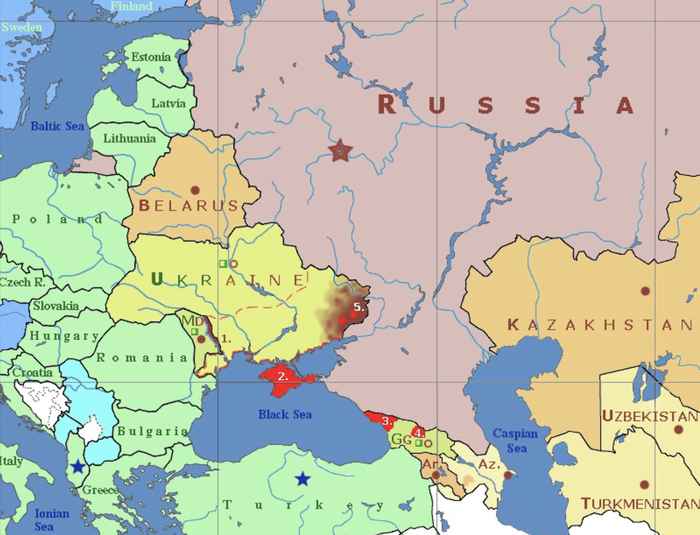Russian Geopolitics: from IIS elective to permanent place in curriculum European Studies
25 May 2023

A steady rise in popularity
“When my colleagues from the Eastern European Studies decided to offer the bachelor course on Russian Geopolitics for the IIS academic programme in 2019, we assumed that the title would attract a lot of students because ‘geopolitics’ has been one of the new buzzwords that draw attention. The number of students exceeded our expectations. Over the four years, there was a steady rise and in the fourth year, we had as many as 113 students.”
Geopolitics in a changing world
“The core topic of the lecture series is the geopolitics of the Russian Federation since its creation in 1992 onwards. The Russian Federation as a large state in the world was the very symbol of the changing paradigms – the shift from the Cold War paradigm to the post-Cold War paradigm that coincides – or rather overlaps - with the ‘globalisation’ paradigm. The lectures cover Russia’s relations with the ‘near abroad.’ This term covers all the neighbouring states that used to be part of the Soviet Union but as of 1992 became independent states. Furthermore, we followed Russia’s relations with these former communist satellites of the Soviet Union – most of which have gone through the Euro-Atlantic integration and have been members of NATO and the EU. Here we concentrated on its relations with Poland, Hungary, Serbia, and Kosovo. We look back at the significance of Putin’s criticism of the NATO intervention in Kosovo and how he used the Kosovo crisis to start a more assertive foreign policy that led to a direct rivalry with the West. This course also looks beyond Europe. One of the very important lectures deals with Russia’s relations with India. Lastly, several lectures deal with the ideological underpinning of Putin’s Russia. Different lecturers look into Russia’s foreign policy strategies through the lens of the terms ‘Russian World’ and ‘Sovereign Democracy’. These ideological concepts could be useful for explaining the nature of Putin’s regime and its designs for the change of Russia’s state borders by claiming the territories in the neighbouring states, such as is the case in Ukraine.”
Armed conflict incites a huge interest
“It is fascinating to witness all over again how the outbreak of an armed conflict incites a huge interest. The war in Ukraine is no exception. When we started in 2019, we had some 60 students; in 2020 and 2021 the numbers went up and down because of Corona lockdowns; after the 2022 invasion of Ukraine, we had more than 100 students from many different faculties who signed up for this course. It was good that we continued into the fourth year. Most IIS courses end after three years. We got an extra chance to run it one more year. There was a shared understanding that this course did not lose relevance. We proved out to be right: many students across UvA simply wanted to hear from experts in different fields how to look into the war that came dangerously close to their doorstep.”
Advantages of interdisciplinarity
“After four years of doing this IIS elective, my colleagues from Eastern European Studies decided to offer it as a bachelor course for our students at the Department of European Studies (EES). Obviously, some changes needed to be introduced so that the format of the lectures and credits fits into the EES curriculum. Students from other departments and faculties will be able to sign up for this course as well. This concept of breaking one general topic down into 10 lectures, given by experts of different disciplines, shows all advantages of interdisciplinarity. It also opened an opportunity for us to invite one or two colleagues from abroad to give a lecture via Zoom. In that way, we expand the disciplinary framework and also facilitate cooperation with other universities. We want to use Zoom, just occasionally for our colleagues who live and work afar. However, we have learned that nothing can replace the learning process of old fashioned lectures on location.”
Topics that reflect the latest developments
“Once there is a well-working concept – and we had four years to test this one and improve it – the idea is to continue it in the form that produced good results. The attraction of this course for students seemed to be in the combination of the historical, cultural, and political underpinning. From this very sound basis that can be unchanged for years, we can add every year one or two new lecture topics that reflect the newest developments in Russia’s domestic and foreign policy. For example, the redistribution of the influence spheres in Europe, the Middle East, and Africa has been an important driving force behind Moscow’s foreign policy. It is also important to stress that our approach to dealing with this issue is different from a classical course on Russian foreign policy that students might follow. We put stress on current events and have enough resources and flexibility in the programme to respond to the ongoing developments and to incorporate these topics in a robust framework in which we deal with the origins, history, and causal relationships of the complex issues we face in the aftermath of the end of the Cold War.”